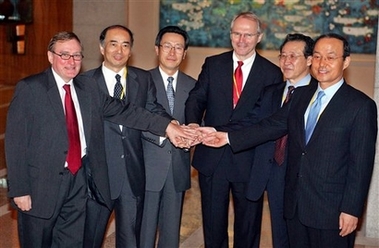Six-party talks to be held soon
(Xinhua)Updated: 2006-10-31 19:39
Special Coverage: North Korea Nuclear Crisis
The six-party talks on the Korean peninsular will be held soon, according to the source from the Chinese Foreign Ministry in Beijing on Tuesday.
 Negotiators for the six-party talks over North Korea's nuclear crisis.,from left, Russian Deputy Foreign Minister Alexander Alexeyev, Director-General of the Japanese Foreign Ministry's Asian and Oceanian Affairs Bureau Kenichiro Sasae, Chinese Vice Foreign Minister Wu Dawei, U.S. Assistant Secretary of State Christopher Hill, North Korean Vice Foreign Minister Kim Kye Gwan and South Korea's Deputy Foreign Minister Song Min-soon, join hands before the start of a banquet meeting in Beijing, China, in this Tuesday Sept. 13, 2005 file photo. North Korea agreed to return to six-party talks on its nuclear program, South Korea's YTN television reported. [AP/file] |
At the invitation of China, the heads of delegations to the talks from China, the Democratic People's Republic of Korea (DPRK) and the United States had an informal meeting in Beijing Tuesday, said the source.
"The three parties agreed that the six-party talks be held soon at a time convenient to the six parties," the source said.
The source said the three heads had a "candid" and "in-depth" exchange of views on continuing efforts to advance the process of the talks.
The six-party talks on Korean nuclear issue have remained stalled since the last round meeting in Beijing last November.
The last round of talks, involving China, the DPRK, the United States, the Republic of Korea, Russia and Japan, ended with a chairman's statement, in which the parties agreed to resume talks as soon as possible.
Chinese Foreign Ministry spokesman Liu Jianchao said on Tuesday that the most pressing task was the resumption of talks at an early date and the establishment of a nuclear weapons free Korean peninsula.
"We would like to maintain consultations with the relevant parties during the process," Liu said.
The DPRK conducted an underground nuclear test on October 9, triggering protests from the international community and complicating the Korean nuclear issue.
Since the test, China has been engaged in a diplomatic campaign.
President Hu Jintao held phone talks with U.S. President George W. Bush, exchanging views on the DPRK nuclear test.
Chinese State Councilor Tang Jiaxuan headed to the United States and Russia October 11 as Hu's special envoy. Later Tang visited the DPRK also as Hu's special envoy, and DPRK leader Kim Jong Il met with Tang on October 19. During the meeting Tang conveyed a message from President Hu to Kim.
ROK President Roh Moo-hyun visited China, where the leaders of the two countries agreed to work more closely on the issue.
U.S. Secretary of State Condoleezza Rice visited China from October 20 to 21 and Chinese Premier Wen Jiabao said there was "no other choice but diplomacy" when addressing the Korean peninsula nuclear issue.
Jin Linbo, of the China Institute of International Studies, welcomed the resumption of the six-party talks, pointing out it's a positive step to avoid the escalating of the crisis and peacefully solve the Korean nuclear crisis.
Trade policy with DPRK unchanged
China's policy of economic and trade cooperation with the Democratic People's Republic of Korea (DPRK) remains unchanged, Chinese Foreign Ministry spokesman Liu Jianchao said Tuesday.
Liu said the economic and trade cooperation between China and the DPRK aims at strengthening the national economy and people's livelihood of DPRK so as to help the country to overcome some difficulties in energy and food supply.
China and the DPRK have been carrying out normal economic and trade cooperation, the spokesman told a regular press conference.
|
||
|
||
|
|